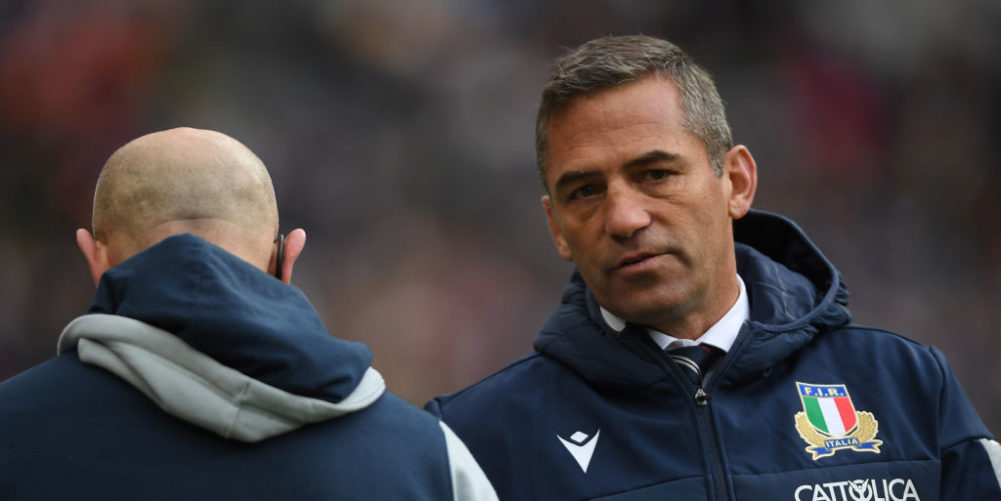The Italian Job, or Rugby Union's version of it, in the shape of a 20-year uncompetitive Azzurri team, is in danger of pulling a treasure trove like the Six Nations over the cliff-face. It is a situation which would not have been tolerated for this long in most professional sports without a serious rescue attempt.
Italy's lack of progress is reflected in a declining rather than improving win rate. From their admission in 2000 until 2015, although Italy have been perpetual tail-enders, there were only five seasons in which the Azzurri were whitewashed, with either two wins (twice), one win (eight times), or a draw (once), recorded in the other 11seasons – with all of those wins in Rome.
However, since the victory over Scotland in 2015, the Italians have drawn a blank for five seasons in succession, with their latest wooden-spoon campaign sealed by England's Championship-clinching victory in Rome last weekend.
It means that Italy have lost their last 20 games in the tournament, with no immediate respite in sight given a fixture list for the 2020-21 Six Nations, starting with Italy facing France at the Stadio Olimpico, then playing England at Twickenham, before hosting Ireland and Wales in Rome, and then finishing against the resurgent Scots at Murrayfield.
The suggestion that it suits Italy's opponents to have an easier ride for one round in five during the tournament, as well as having a trip to Rome for their supporters every two years, may have legs. But, ultimately, if this pro sport becomes more about the convenience of coaches, or having a meal by the Trevi Fountain, than about the competitive quality of the match action, then it's time to mothball the Six Nations.
If the Italian Federation has got it wrong through chronic flaws in its domestic structure, reflected in its inability to promote the sport outside limited core areas, then criticism should be heaped in equal measure on the Home Unions and France.
When you admit a new nation to your flagship tournament there has to be a recognition that you are duty-bound to give them every opportunity to become competitive, unless you want a lame duck element to be introduced.
This means having a comprehensive programme to raise standards, starting with high quality coaching from top to bottom, with a clear focus to have top end overseas coaches working with the best in Italy at international level, with others positioned strategically throughout the league structure to ensure a regular supply of young, talented players.
It is a difficult area, because in a pro sport it is counter-intuitive to give your opponents the tools to dismantle you at a later date. However, that risk is offset by the importance of ensuring the competitiveness of your tournaments, and growing the popularity of Rugby Union, which is what all national unions should be dedicated to achieving.
I am not convinced that Italy have had the high-quality coaching structure required to make them competitive in the Six Nations since their inclusion.
Italy's first head coach of the pro era was the former All Black prop Brad Johnstone. He did the job for two and a half years and his successor, the great New Zealand wing, John Kirwan, lasted three years.
While Johnstone had coached Fiji before taking the Italian job, he was not an experienced international coach, and Kirwan, who had played for Benetton Treviso, had even less top-level coaching exposure.
Pierre Berbizier came next, and the 40 per cent win ratio the former French captain and coach achieved in his tenure of just under two and a half years, is comfortably the most successful.
Berbizier had gone straight from playing for France to coaching them for four years, winning the Five Nations title in 1993. That hard-earned experience served him well as he took Italy to a fourth place finish in the 2007 Six Nations after victories over Wales and Scotland, which saw the Azzurri secure two wins in the same campaign for the first time.

When the successful former Springbok coach Nick Mallett took over there were high hopes that the upward curve would be maintained, but his four-year stint from 2007-2011 petered out without any big gains, and Jacques Brunel took over.
Brunel, who had coached in French club rugby for 23 years, finished with a record over the next four and a half years that mirrored Mallett's win ratio of just over 20 per cent –although he hit a high point with another fourth place finish after wins over France and Ireland in 2013.
When he was succeeded by Conor O'Shea in 2016, the former London Irish and Harlequins coach spent three winless Six Nations campaigns in charge, before resigning after the 2019 World Cup and being replaced by the incumbent, Franco Smith.
The former Springbok fly-half is not short of familiarity with Italian rugby culture, having played for Benetton Treviso for three years, and then coached them for a further four years, before returning to South Africa to coach the Cheetahs.
However, like many Italy coaches, Smith has no previous international experience, and if he lasts for anything more than three years it will be a surprise, because among his pro-era predecessors that has been the average length of tenure.
That turn-over is too high to deliver the continuity or consistency in terms of tactical approach, or selection, required at international level. It is also bound to impact on the relationship required with Italy's two provincial super clubs, the Parma-based Zebre, coached by former Ireland scrum-half, Michael Bradley, and Benetton Treviso, who have former All Black full-back Kieran Crowley in charge.
The Italian Federation, and the other Six Nations unions, should take a policy decision that the track-record of elite level Italy coaches should mirror those over the last eight years in Japan, where high calibre operators like Eddie Jones and Jamie Joseph have made a clear difference.
Japan were deserved 2019 World Cup quarter-finalists, whereas Italy are nowhere close to making a similar statement, either globally or in the Six Nations. So far, Rugby Union's Italian Job has been badly bungled, and it needs an urgent fix.
NICK CAIN

























